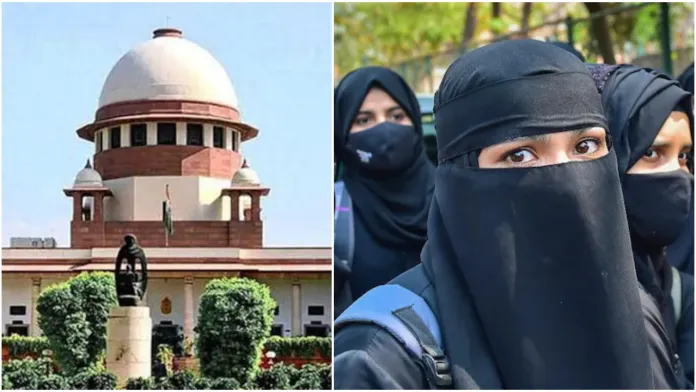Rehan Khan
The Supreme Court has agreed to hear a plea challenging the Bombay High Court’s decision to uphold a ban on students wearing hijab, burqa, and niqab at NG Acharya and DK Marathe College in Chembur, Mumbai. The plea, filed by nine students, questions the legality and constitutionality of the college’s dress code, which mandates formal and religion-neutral attire.
A Bench comprising Chief Justice of India DY Chandrachud, and Justices JB Pardiwala and Manoj Misra, has scheduled the case for hearing. “Yes, we will give a date in this case and hear it,” remarked the Bench, acknowledging the urgency due to impending unit tests.
The Controversial Dress Code
The issue arose from a notice issued by the college, part of the Chembur Trombay Education Society, in May, requiring students to adhere to a new dress code from June onwards. The dress code specifies that students must wear formal and decent attire that does not reveal their religion. For boys, this means full or half shirts and normal trousers, while girls are required to wear non-revealing Indian or Western dresses. The college provides a changing room for girls.
The notice specifically bans burqas, hijabs, niqabs, caps, badges, and stoles, stating that the purpose is to prevent any display of religious affiliation, thereby enabling students to focus solely on their education.
Bombay High Court’s Ruling
The students initially challenged the dress code at the Bombay High Court, arguing that it violated their fundamental rights under Articles 19(1)(a) (freedom of speech and expression) and 25 (freedom to practice religion) of the Indian Constitution. They contended that wearing hijabs and niqabs is an integral part of their religious practice and personal choice, and the ban imposed by the college was arbitrary and discriminatory.
However, the High Court dismissed their plea on June 26. A Bench of Justices AS Chandurkar and Rajesh Patil ruled that the dress code did not infringe on the students’ fundamental rights. The court observed that the directive aimed to ensure that students’ attire does not reveal their religion, thus fostering an environment focused on academic pursuits. The court emphasized that the dress code was a measure to maintain discipline within the educational institution, which falls under the college’s right to establish and administer itself as provided by Article 19(1)(g) and Article 26 of the Constitution.
The court also rejected the argument that wearing hijabs and niqabs constitutes an essential religious practice, citing the lack of substantial evidence to support this claim.
Arguments Before the Supreme Court
In their appeal to the Supreme Court, the students have reiterated that the dress code imposed by the college, affiliated with Mumbai University and aided by the State of Maharashtra, is without legal authority and is discriminatory. The plea asserts that the dress code is “manifestly arbitrary” and violates the principles of equality enshrined in Article 15 of the Constitution, as it disproportionately affects Muslim female students by restricting their access to education.
The petitioners also argue that the ban on religious attire does not disrupt classroom discipline or the educational process. They point out that guidelines from the University Grants Commission (UGC) and the National Education Policy emphasize inclusivity and aim to increase access to higher education for marginalized communities, including Muslims.
The plea, drafted by advocate Hamza Lakdawala and filed through advocate Abiha Zaidi, highlights the broader implications of such bans on religious attire, referencing the Supreme Court’s yet-to-be-concluded deliberations on similar issues, such as the hijab controversy in Karnataka.

